Today, our daily choices have deep impact on the environment, the quest for sustainable living is moving from a niche interest to a global imperative. Our homes are the center for this transformation, filled with items we use without a second thought, many of which are made of plastic. The good news? Making a change doesn’t require a monumental overhaul. Often, it’s about simple, thoughtful substitutions. Enter bamboo—a remarkable grass (yes, it’s a grass!) that is revolutionizing eco-friendly living. Fast-growing, renewable, and biodegradable, bamboo offers a sturdy, stylish, and sustainable alternative to plastic’s pervasive grip. Let’s see five everyday plastic products you can easily replace with beautiful bamboo counterparts, starting today.
- The Plastic Toothbrush: Replace with a Bamboo Toothbrush
The Plastic Problem:
Thank about this: almost every plastic toothbrush ever made still exists somewhere on the earth. With billions discarded annually, each taking over 400 years to decompose, they are a significant contributor to landfill waste and ocean plastic pollution.
The Bamboo Solution: A Bamboo Toothbrush
Using a bamboo toothbrush is one of the simplest and most impactful changes you can make.
- Why it’s a Great Choice: Bamboo is a naturally antimicrobial material, meaning it resists bacteria buildup. It’s also highly renewable, with some species growing up to three feet in 24 hours. The handle is just made from Moso bamboo, which is not part of the panda’s diet, and is fully biodegradable.
- How To Choose: Ensure the bristles are BPA-free. While the most sustainable option is bristles made from castor bean oil (biodegradable), many brands use nylon bristles for familiarity. If so, you can snap off the head with pliers before composting the handle. Brands like Brush with Bamboo, The Humble Co., and others offer excellent choices.
- The Transition: The brushing experience is actually same as a plastic brush. You’ll get the same clean feeling, with the added satisfaction of knowing your oral hygiene isn’t costing the Earth.
- The Plastic Cutting Board: Replace with a Bamboo Cutting Board
The Plastic Problem:
Plastic cutting boards can develop deep grooves by knife cutting, which become breeding grounds for harmful bacteria like E. coli and Salmonella. While plastic cutting boards are often dishwasher-safe, the deep scratches are difficult to sanitize completely. Besides, they shed microplastics over time, which can end up in your food and the environment.
The Bamboo Solution: A Bamboo Chopping Board
A sturdy bamboo cutting board is not just an eco-upgrade; it’s a kitchen upgrade.
- Why it’s a Great Swap: Bamboo boards are incredibly hard and durable, more resistant to knife scarring than many softwoods. Their natural density gives them natural antimicrobial properties, making them more hygienic. They are also gentler on your knife blades while comparing with harder materials like glass or stone.
- How to Choose: Choose a bamboo cutting board which should be made from solid, compressed bamboo strips, not just a thin bamboo veneer over another material. Another tip, Look for a board finished with food-safe standard, natural oils like mineral or coconut oil. Avoid those used with chemical-based sealants.
- The Transition: Your bamboo chopping board will add a touch of warm, natural elegance to your kitchen. To maintain it, hand wash it quickly with mild soap and warm water, and do not soaking it or putting it in the dishwasher. Regular oiling will keep it from drying out and cracking.
- Single-Use Plastic Cutlery & Utensils: Replace with Bamboo Utensils
The Plastic Problem:
The convenience of plastic forks,knives, and spoons comes at a incredible environmental cost. Hundreds of billions of single-use plastic utensils are used and discarded each year, clogging landfills and polluting waterways. Even plastic kitchen utensils such as spatulas and spoons can degrade with heat, leaching chemicals into food.
The Bamboo Solution: Bamboo Cutlery Sets and Utensils
Bamboo supplies a reusable, lightweight, and beautiful swap for all your culinary needs.
- Why it’s a Great Swap: For on-the-go meals, carrying a portable bamboo cutlery set can avoid using the disposable plastics. At home, bamboo cooking spoons, spatulas, and salad servers are heat-resistant, non-scratching, and have a great hand feel.
- How to Choose: For travel sets, ensure they come in a convenient carry pouch. For kitchen utensils, check that the joints are secure and the finish is smooth. Similar as bamboo cutting boards, ensure they are treated with food-safe standard oils.
- The Transition: Keep a travel set in your work bag or car. At home, using bamboo utensils is very convenient, unnecessary to change frequently. They are easy to clean, while cooking and dining you can feel the organic and rustic charm.
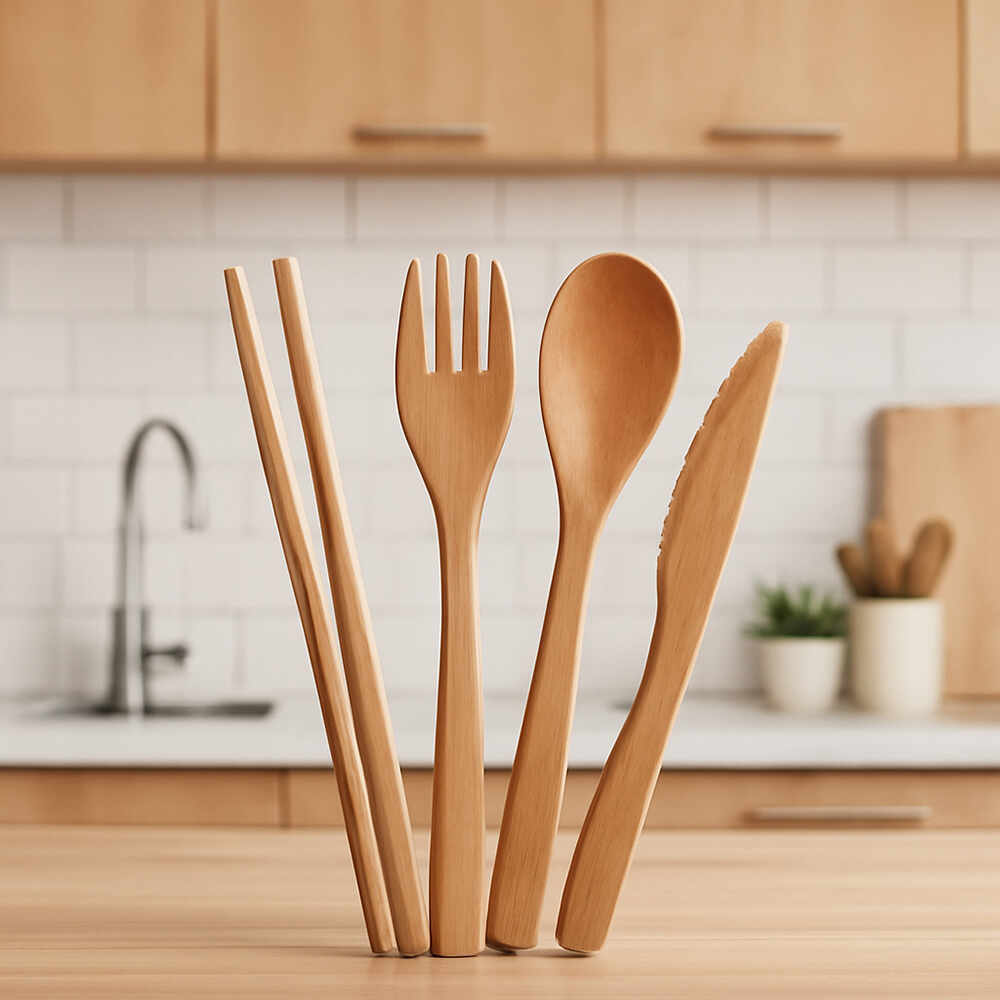
- Paper/Plastic-Wrapped Paper Towels: Replace with Bamboo Paper Towels
The Plastic Problem:
While the paper towels themselves are paper,they are often transported with plastic packaging. What is more, their single-use nature generates immense waste, and their production contributes to deforestation and requests lots of water and energy.
The Bamboo Solution: Reusable Bamboo Paper Towels
This swap solves the problem of plastic and paper waste simultaneously.
- Why it’s a Great Swap: Reusable bamboo “paper” towels are made from highly absorbent bamboo fibers, often combined with cotton. They are a durable, washable, and incredibly soft alternative. A single roll of reusable towels can replace hundreds, if not thousands, of conventional paper towel rolls over its lifetime.
- How to Choose: These towels typically come in multi-packs. They are designed to be used, rinsed, washed, and reused dozens of times. Some brands are even designed to be composted at the end of their life. They are suitable for cleaning spills, wiping surfaces, and even as napkins.
The Transition: Just place them in a bamboo napkin box on your counter. After use, toss them in a wet bag or bamboo waste bin until laundry day. For small spills, you can rinse, wring, and reuse immediately. This swap will obviously cut down your kitchen waste and save you money in the long run.
- Plastic Storage Bins and Baskets: Replace with Bamboo Baskets and Bamboo Organizers
The Plastic Problem:
Plastic storage tubs and cheap plastic bins are everywhere in our homes for organization. They are often made from non-recycled materials and can become brittle and break over time, discarded finally in landfills.
The Bamboo Solution: Bamboo Storage Baskets and Organizers
Give up the cold, synthetic look of plastic and choose the warm, textured beauty of bamboo.
- Why it’s a Great Swap: Woven bamboo baskets are incredibly versatile, strong, and breathable. They are excellent for organizing everything from toiletries and towels in the bathroom, to fruits in the kitchen, toys in the living room, and accessories in the bedroom. They naturally are a functional piece of home decor.
- How to Choose: Bamboo organizers come in all shapes and sizes—from small drawer dividers to large bamboo laundry basket. Look for sturdy weaving and a robust structure. Some are made with flexible bamboo strands, while others use rigid bamboo slats for more structured boxes.
- The Transition: Start with one area. Replace a plastic fruit bowl with a beautiful bamboo basket. Use a small bamboo tray to put your daily essentials on a dresser. This simple change can warm up a room and make your space feel more elegant and calm.
Making the Shift, One Swap at a Time
The journey to a less plastic-dependent life is not about perfection; it’s about progress. Each bamboo product you choose is a positive vote for a healthier earth. These changes are not only easy to carry out but also add aesthetic value to your daily life. By starting with these five essentials—your bamboo toothbrush, bamboo cutting board, bamboo utensils, bamboo towels, and bamboo storage—you embark on a powerful path of conscious consumerism. So, take that first step, embrace the graceful strength of bamboo, and transform your home into an oasis of sustainability.

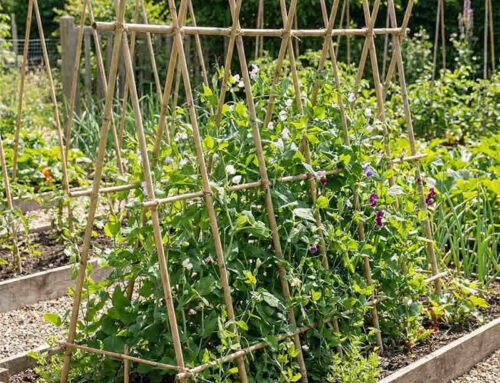
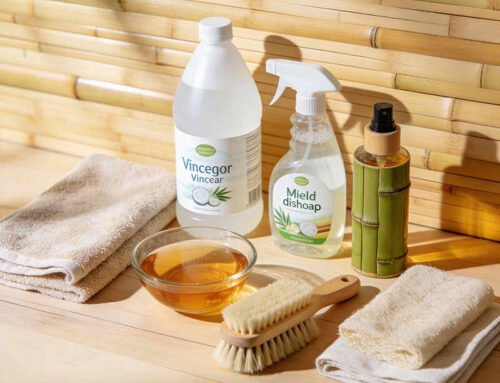
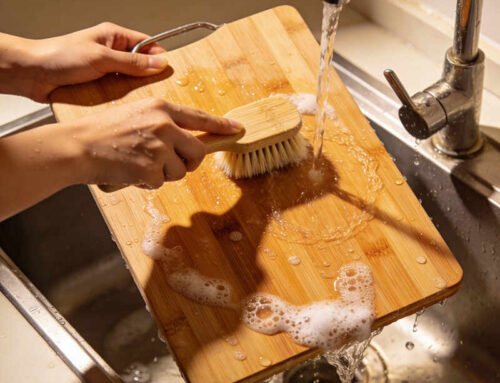
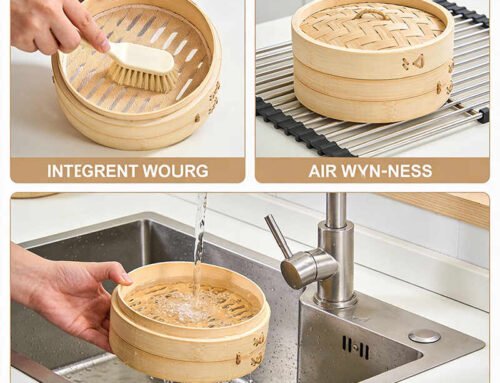

Leave A Comment